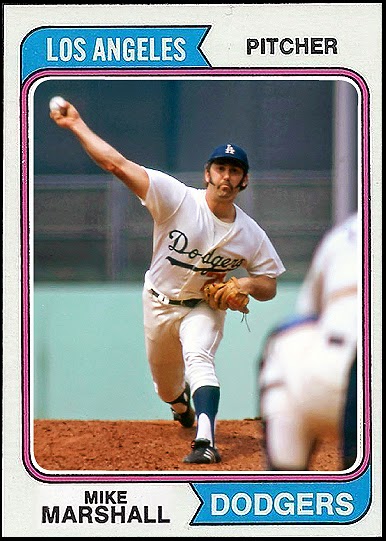Here's a fun little quiz I put together for this week.
Take a stab and see how many you can get.
Answers posted tomorrow.
1. What pitcher posted 27 saves and a 2.04 E.R.A. in 1970, yet had a record of 2-14 and blew 11 saves?
2. Three pitchers in the decade tied for most appearances in a season without posting a single save. Who are they?
3. Who posted the highest number of losses in a season during the decade without starting a single game?
4. These two pitchers posted the highest total of wins in a season during the '70's in which they never started a game. Who are they?
5. Who posted the lowest E.R.A. in any season during the decade in which they pitched 100+ innings?
***SPOILER ALERT! ANSWERS BELOW:
1. Darold Knowles, Senators.
2. Jim Panther, Rangers (1972), Gary Ross, Padres (1973) and Warren Brusstar, Phillies (1978). They all appeared in 58 games without a save.
3. Gene Garber, Braves. He lost 16 games without a start in 1979.
4. John Hiller, Tigers (1974) & Bill Campbell, Twins (1976); they each won 17 games, all in relief!
5. Bruce Sutter, Cubs. He posted a 1.34 E.R.A. in 1977.
2. Three pitchers in the decade tied for most appearances in a season without posting a single save. Who are they?
3. Who posted the highest number of losses in a season during the decade without starting a single game?
4. These two pitchers posted the highest total of wins in a season during the '70's in which they never started a game. Who are they?
5. Who posted the lowest E.R.A. in any season during the decade in which they pitched 100+ innings?
***SPOILER ALERT! ANSWERS BELOW:
1. Darold Knowles, Senators.
2. Jim Panther, Rangers (1972), Gary Ross, Padres (1973) and Warren Brusstar, Phillies (1978). They all appeared in 58 games without a save.
3. Gene Garber, Braves. He lost 16 games without a start in 1979.
4. John Hiller, Tigers (1974) & Bill Campbell, Twins (1976); they each won 17 games, all in relief!
5. Bruce Sutter, Cubs. He posted a 1.34 E.R.A. in 1977.

.jpg)



































